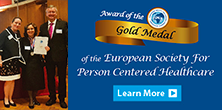A lifeboat for lost minds
How to help those with dementia to reengage with the world they are struggling to live in and to provide meaning and value to their lives.
I just wanted to, belatedly, write up this last blog, for the night, to commend a wonderful presentation by Carol Saba a consultant and educator certified in the Montessori Method for Dementia™.
The talk was on 23rd September and was held at Forest Hill Place (a Revera retirement residence) which is on Castlefield Avenue in Forest Hill.
Carol is from an organisation called Dementiability Enterprises that provides two day workshops (and much more) on the Montessori Methods for Dementia™. These methods were developed by Gail Elliot, founder and CEO of Dementiability.
During the evening we were introduced to these methods and how they work to improve the lives of people living with dementia. Areas of interest that were covered included the philosophy of care for supporting people with deep memory loss and the origin of the methods and their connection to Dr. Maria Montessori’s educational practices and principles. The Dementiability website provides a number of free resources, guides and information and more information on the workshops.
Now I am no expert on dealing with Alzheimer’s but the Montessori Method™ did strike me as being a pragmatic and accessible way for caregivers to interact much more effectively with those with dementia in its many shapes and forms. More importantly it appears, to some meaningful extent, to help reengage those with dementia with the world they are struggling to live in and to provide value and meaning to their lives.
I am not going to pretend I know all about this area, nor am I going to plagiarise the words of others in an attempt to appear knowledgeable, so I will quote and attribute as follows:
From the L’Chaim Retirement Homes Website
The Montessori method was developed by Maria Montessori, MD., PhD, over one hundred years ago, as a tool to teach children deemed “unreachable”. Dr. Cameron Camp is responsible for the research that connected Dr. Montessori’s principals & techniques to reaching people with dementia. This method was proven successful as it is based on the use of muscle memory. Muscle memory is that part of the memory that is used in repetitive muscle movement, for example in remembering how to ride a bike, play a musical instrument or read- Muscle memory (sometimes called procedural memory) tends to be less damaged in people with dementia and Alzheimer’s. Because this procedural or muscle memory system may still be working properly in people who have dementia, *Montessori Methods for Dementia™ can be used very successfully as a means to reach and engage people with memory loss”
From the Saint Elizabeth website
It is important to understand the type of memory that is spared in dementia, procedural memory – such as how to eat, how to dress, or reading..….Putting the Montessori method into practice The Montessori approach focuses on re-discovering and supporting the person behind the dementia. Activities with meaning and purpose are put back into people’s lives, based on their needs, interests, skills and abilities. People with dementia often feel they are always being told what to. They are adults and often do not need to be told, but they do want to be needed and feel useful.”
And there are some other useful articles and information about the methods and their impact, and these are noted below:
-
Using the Montessori method to combat dementia (Globe & Mail)
-
Montessori method for dementia care fosters residents’ independence (Leisureworld Senior Care Corporation)
After the presentation, tea and some lovely pastries were provided and this also encouraged families, attendees, staff and residents to mingle and socialize.
